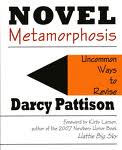Get regular updates from Fiction Notes
Novel Diagnosis Series
Introduction
Characters
Dialogue
Scenes
Voice
VoiceRevisited
Plot

When a writer sets out to revise, perhaps the hardest thing they face is knowing what to revise. This is often because they are Unconsciously Incompetent in one or more areas.
Does that sound insulting? I don’t mean it that way. One way of describing the learning process is in terms of competencies.
Stages of Learning
Unconscious Incompetence
Conscious Incompetence
Conscious Competence
Unconscious Competence
First is the level of unconscious incompetence (you don’t know and you don’t know that you don’t know). A step up is learning that you are incompetent in an area (you don’t know, but you know that you don’t’ know). When you move to a level of competence, it is usually because you’ve been consciously working on the skills and knowledge needed for competence (You know and you know that you know). The final step is unconscious competence (you know, but you don’t know that you know), in which skills and knowledge are internalized and almost automatic.
Often, the most important thing you can learn is that you are incompetent in an area. That means you have moved up one level from not knowing to knowing that you need to work on something. That’s real progress.
Self-Diagnosis: How to Know What to Revise
For the next ten days or so, I’m going to be posting about doing a self-diagnosis of your writing skills, your strengths and weaknesses. Yes, a particular manuscript will need revision, but in a larger sense, writers need to tackle their weak areas and make progress toward general competence. My intent is help you identify areas that need work; I would expect you to seek out resources for any areas that you identify as weak, so that your novel revision will be effective.
You’ll be asked to rate yourself on the scale of competence. I hope that some of you will see that you are unconsciously competent in many areas! But you might also learn that you are unconsciously incompetent in some areas. That would be valuable knowledge, because then you can study and practice and improve. You can’t fix what you don’t know needs fixing!
Competence is a hard-won prize that only comes with lots of study and practice.
Tomorrow: Characters
11 thoughts on “0”
Comments are closed.